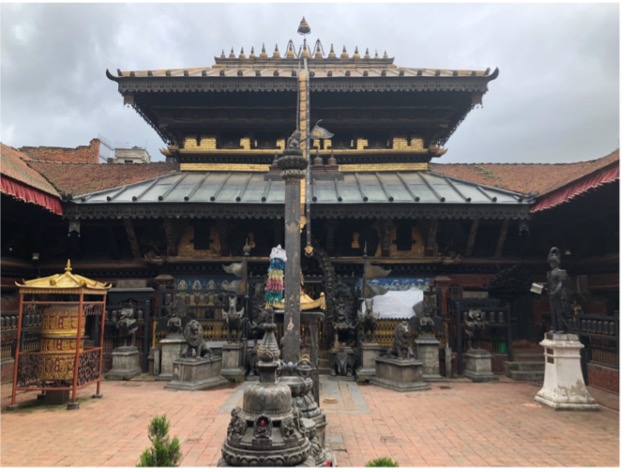Teaching English in Nepal

2019 volunteer
Francis Brown (2017, Music)
This summer, I received a volunteering travel award from the Trinity Hall Association to travel to Nepal, where I volunteered for a month with a charity that works to support rural state schools in the Helambu region. The charity, HELP (Helambu Educational Livelihood Project) raises money for schools to improve their resources, sends three rounds of volunteers out each summer from UK universities, and runs a Nepal-based teacher training program, called the ‘Saathi Program’ similar to the ‘Teach First’ program in the UK.
I flew out to Kathmandu in mid-July, where I joined a group of three other volunteers from Cambridge, Durham and Aberdeen. Due to a longer-than-planned school holiday in the village we were scheduled to travel to, we volunteered in two primary schools in the Bungamati region of Kathmandu for the first week. I was paired with one of the other volunteers, and we spent this first week together, sharing the teaching of the morning lessons in the same school. With the help of a local teacher, we taught English, Maths, Science and Citizenship (the last being a particularly interesting way to hear about Nepalese culture as well as share our own experiences of growing up in the UK).
At the end of the week we travelled to Lapse, the village in the Bagmati region to which we had originally been assigned. The village had been affected by the earthquake in 2015, and most of the houses and infrastructure had been destroyed and subsequently rebuilt. Almost all of the villagers were subsistence farmers, growing rice and corn (both of which we ate, several times a day, every day!). During the rainy season, the village is cut off from vehicle access and can only be reached on foot; being two hours walk from the nearest bus route, it felt really quite isolated. The school was a primary school, with students aged 3-13, of which there were roughly a hundred. The facilities were basic – one whiteboard in each classroom, and intermittent electric lighting – and the student’s English comprehension was very limited. Luckily, two of the recently qualified ‘Saathi Teachers’ who we had met in Kathmandu had just started working at the school. We quickly made friends with them, and shared lots of our classes with them for mutual benefit. We stayed with a host family who ran a small café and shop in the village. This meant that we got to see and experience lots of village life, as there was a constant stream of villagers coming to buy food and have a drink at the café.
Over the course of our three week stay, we taught English and Maths to the students, and ran some after-school English classes for the teachers. By the end, we felt that we had made good friends with all the teachers, and many of the students. On our final day, the school put on a leaving celebration for us, during which we met and thanked the first governor and founder of the school. On our days off, we trekked further up the mountain to another village, took a bus the largest town in the region, and attended a volunteer’s gathering which coincided with a Buddhist festival in a town called Manekarka.
I am very grateful for the travel grant – which went mostly towards my accommodation and travel expenses – without which I wouldn’t have been able to take part in the program. I would like to express my sincere gratitude to the Trinity Hall Association for their enormous generosity, and wholeheartedly encourage them to support such work in the future. The break taking scenery, hospitality of the community and willingness of the students to learn will stay with me for ever – as will my new-found passion for dahl!
As well as being such an immensely gratifying experience for me, I hope that it was also beneficial for the schools and communities where we lived and taught for a month.